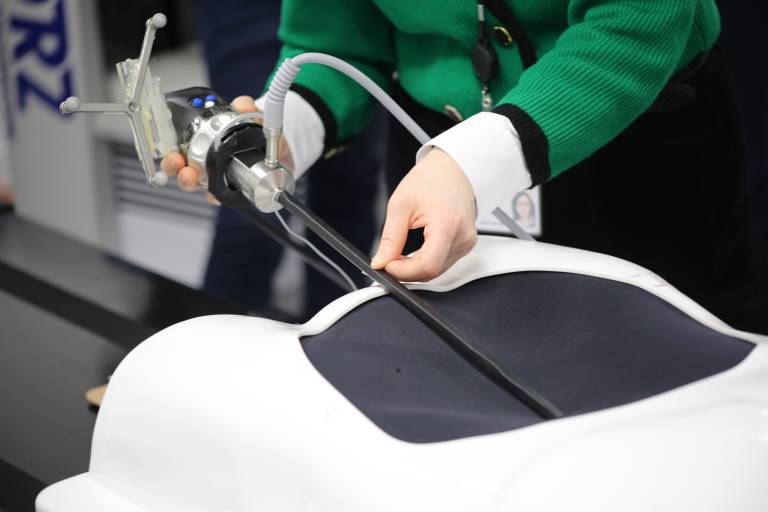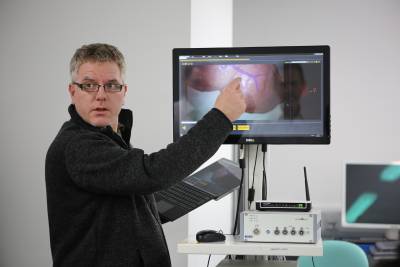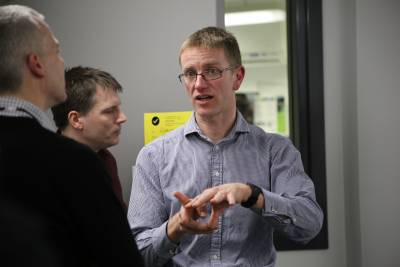New NIHR award to improve outcomes for liver cancer patients through minimally-invasive surgery
13 February 2018
A recently funded NIHR
 nihr.ac.uk/funding-and-support/funding-for-research-studies/funding-programmes/invention-for-innovation/">Invention
for Innovation (i4i) programme
aims to improve outcomes for liver cancer patients by making "keyhole" surgery
more accessible.
nihr.ac.uk/funding-and-support/funding-for-research-studies/funding-programmes/invention-for-innovation/">Invention
for Innovation (i4i) programme
aims to improve outcomes for liver cancer patients by making "keyhole" surgery
more accessible.
The three-year project, led by Dr Matt Clarkson, was launched at a meeting on Thursday 8 February 2018. The meeting brought together patient representatives, funders and collaborators for an overview of the project's objectives and an exciting demonstration of the existing SmartLiver technology that the project will build from.
Since the late 1970s liver cancer incidence rates have more than tripled in the UK and the disease continues to have particularly high mortality rates.
Currently, only about 10% of liver cancer patients are deemed eligible for "keyhole" surgery, otherwise known as laparoscopic surgery or minimally-invasive surgery.
This is mainly due to the complexity of the liver anatomy and the high-risk of bleeding when operating close to major vascular or the uncertainty of tumour margins which cannot easily be identified using the laparoscopic tools currently available.
However, minimally invasive surgery has significant benefits to patients over open surgery, including less post-operative pain and faster recovery time. The aim of this project is to make laparoscopic surgery for liver cancer patients a more viable, less risky option and increase its uptake, therefore helping patients to avoid the physical and psychological burden of open surgery.
The work funded through the NIHR i4i programme will build on existing SmartLiver technology that Dr Clarkson and his team have been developing since 2012.
The SmartLiver software provides the surgeon with additional information to reduce the risk of surgery, assisting with pre-operative planning and real-time image-guidance.

Larger lesions and those close to major vascular and biliary structures are generally considered too high risk for the laparoscopic approach. However, pre-operative imaging modalities such as computed tomography (CT) are able to clearly identify the location of vessels and tumours.
The SmartLiver technology is able to convert a pre-operative CT scan to a patient-specific model of the liver, and then overlay this model with the live laparoscopic video feed during surgery. This aims to enhance the limited field view of the surgeon, giving them greater awareness of what vital sub-surface structures need to be avoided as they operate.
The process of calibration, reconstruction and alignment of the patient's liver is highly complex and the technology has gone through various stages of improvement, moving from porcine to patient trials. The initial patient trials at Royal Free Hospital have involved 20 patients and have demonstrated the feasibility and safety of the software.
The next stage of research has been enabled by the NIHR's i4i award. It will involve 18 months' development and 18 months' feasibility study.
The main objectives of this stage are centred around improving the usability of the software and optimising it to be used in a clinical setting.
A particular focus is to achieve easier and more accurate alignment of the CT data to the laparoscopic video and to ensure that there is minimal interruption to the surgeons' workflow throughout this process. A key metric of success will be receiving a positive evaluation of the system from clinicians.
By the end of the project, a comprehensive system that is easy for surgical staff to use aims to be ready for clinical trial and commercialisation.
The software has a strong potential patient impact; by reducing the risk of laparoscopic liver resections, it aims to increase the number of liver cancer patients undergoing minimally-invasive surgery rather than open surgery. This will speed recovery time, lessen physical pain and crucially reduce the psychological burden of invasive, open surgery.
An uptake of laparoscopic surgery would also vitally save the NHS money on length of hospital stays and health-related costs. There is future potential for the software to be applied to other abdominal procedures, such as pancreas, kidney and gallbladder surgery.

Dr Clarkson said, "All patients that require liver surgery should be able to benefit from minimally-invasive surgery, and this project aims to make that a clinical reality. It is a truly interdisciplinary effort that would not be possible without the collaboration of patients, clinicians, engineers and computer scientists."
Dr Clarkson works within the Translational Imaging Group (TIG) in the Centre for Medical Image Computing (CMIC) at UCL. The project is a close collaboration with Professor Brian Davidson and other clinicians at the Royal Free Hospital.
The National Institute for Health Research (NIHR): improving the health and wealth of the nation through research.
Established by the Department for Health and Social Care, the NIHR:
- funds high quality research to improve health
- trains and supports health researchers
- provides world-class research facilities
- works with the life sciences industry and charities to benefit all
- involves patients and the public at every step
For further information, visit the NIHR website.

This project is supported by Bowel Cancer UK.
 Close
Close

